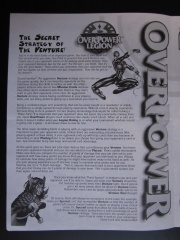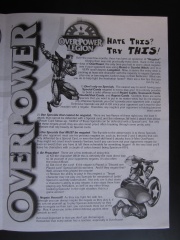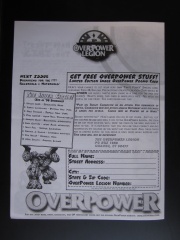Difference between revisions of "The Mission Statement Volume 1 Issue 2"
m (→Page 2) |
m (→Page 2) |
||
| Line 21: | Line 21: | ||
===The Secret Strategy of Venture=== | ===The Secret Strategy of Venture=== | ||
| − | + | ''You're in the third battle of an important game. You look at your hand and feel ok with what you have. You think to yourself that you'll Venture one, maybe two if your opponent seems to be looking particularly behind. Then your opponent Ventures two for the win! "For the win", you think, "But it's only the third Battle!" That's when you remember that your opponent won the last two Battles on bets of three and two respectively. How did he get so far ahead?!'' | |
Sound familiar? An aggressive Venture strategy can not only win the game quickly, but it can keep the opponent on the defensive during the climb to victory as well. Too often, players Venture only one or two Mission Cards because they either aren't confident with their Hand or they don't want to give their opponent a free card. An aggressive Venture strategy means having confidence in your playing skills, and not being afraid of giving up a card when you need to. | Sound familiar? An aggressive Venture strategy can not only win the game quickly, but it can keep the opponent on the defensive during the climb to victory as well. Too often, players Venture only one or two Mission Cards because they either aren't confident with their Hand or they don't want to give their opponent a free card. An aggressive Venture strategy means having confidence in your playing skills, and not being afraid of giving up a card when you need to. | ||
Revision as of 15:51, 14 June 2012
Contents
Page 1
A Quick Look at the All-New Aspect Cards
Until now the real strength and strategy behind the Location card was in using it as a Battlesite. However, OverPower's latest release, X-Men OverPower, brings the Aspect card to the game and will no doubt make people start to think twice about how best to use those Locations!
Using a Location as a Home Base has been risky strategy because of how they limit the characters you may use. It was much easier to build a deck using one of the "Any-Team" Home Bases (such as "Marvel Universe") and select characters based on t heir Power Grids and Specials than it was to use a specific Location as a Home Base and limit yourself to a predetermined list of characters. By granting specific Home Bases abilities beyond those possessed by the characters, Aspect cards make more than a few Location cards exciting and competitive options!
What follows are just a few examples:
X-Mansion - In hard core tournament rings, the Inherent Ability of this Home Base had been laughed at. Lets face it, since many people don't feel that DoubleShots are even worth using, being able to combine Strength Power cards with any DoubleShot card isn't the most useful benefit. Not any more! X-Mansion's Aspect, "Mutant Schooling", gives an X-Mansion team the ability to draw a card from the top of the Draw Pile immediately after playing any DoubleShot card! Replacing DoubleShot cards played with fresh cards from the Draw Pile can really open your hand up to new possibilities, not to mention the Spectrum KO danger that a steady stream of DoubleShot attacks pose!
Wundagore Mountain - The main difficulty in putting this team together is that the Power Grids of the six characters do not line up well with each other. To compensate for this, Wundagore Mountain's "Knights of Wundagore" Aspect card give this team a level 7 Any-Power card that not only may be used to attack or defend, but also doesn't duplicate with any other level 7 Power cards you may have! What's even better is that this card isn't limit to one-per-deck!
Department H - As if having a Homebase with three characters with 8's in their Power Grid (all in the same skill) wasn't enough, once they get their Aspect into play, all of their Power card hits are +1 to Venture! Even though the Aspect card is one-per-deck, the fact that Wolverine is getting a useful Special called "Tracking Senses" in the X-Men MegaPower promotional subset makes it possible to be able to draw and play that Aspect card immediately from your Draw Pile! Once the Aspect is in play, your Power cards can start adding to Venture more and more.
So dig out those Location cards, slap an Aspect or two into your deck and enjoy!
Page 2
The Secret Strategy of Venture
You're in the third battle of an important game. You look at your hand and feel ok with what you have. You think to yourself that you'll Venture one, maybe two if your opponent seems to be looking particularly behind. Then your opponent Ventures two for the win! "For the win", you think, "But it's only the third Battle!" That's when you remember that your opponent won the last two Battles on bets of three and two respectively. How did he get so far ahead?!
Sound familiar? An aggressive Venture strategy can not only win the game quickly, but it can keep the opponent on the defensive during the climb to victory as well. Too often, players Venture only one or two Mission Cards because they either aren't confident with their Hand or they don't want to give their opponent a free card. An aggressive Venture strategy means having confidence in your playing skills, and not being afraid of giving up a card when you need to.
Being a confident player isn't something that can be easily taught in a newsletter or article. Confidence is simply gained through playing experience. Without a lot of playing experience, the best thing to do is pretend! In card playing terminology that would be called having a "Poker Face. It is important that your opponent does not sense any uncertainty coming from you. Good OverPower players smell weakness like sharks smell blood! When all is said and done, it doesn't matter what your Legion Rating is, or what your tournament win/loss record is going into a game - it all comes down to one one one.
The other major stumbling block in playing with an aggressive Venture strategy is a reluctance to give your opponent cards. Unless there are extenuating circumstances (like playing against a Draw deck), if your opponent ends up with less cards than you because of discarding or poor Placing there is no reason you should fear giving your opponent a card or two. Just remember to try and keep an overall card advantage.
As the game goes on, there are a lot more factors that can influence your Venture. You know what your opponent discards and you can see what he has Placed. That's useful information! Make sure that you compare the number of points of damage that you can dish out to your opponent with how many points you know that your opponent can dish back to you. Always try to estimate how many points of damage he might have tucked away in his hand as well. As you gain playing experience you'll discover a way to estimate what works best for you. Starting out, try a "5-Point Average". That is, assume that each card in your opponent's Hand that you don't know can do 5 points of damage to your team. Not a guaranteed system, but then again, none of them are.
Once you know what the "Point Spread" is between you and your opponent, you'll be able to figure out what your Venture should be. If it matches up pretty even, then Venture light. But if you've got a lot more points don't be afraid to Venture heavy. Remember, each card he draws will potentially add to his Venture Total though!
Of course, there will always be exceptions to the rules. For example, there are Special cards that manipulate Venture so that the number of points left around doesn't matter as much as playing a few critical cards. Or, Special cards that allow for a mid-battle drawing. Still, these deck designs spring from a solid knowledge of good Venture strategy. Once you learn the system, you can learn how to make it work to your advantage!
Good Luck and Venture Well!
Page 3
Page 4
| |||||||||||



